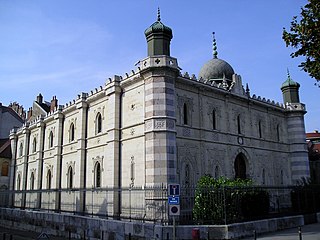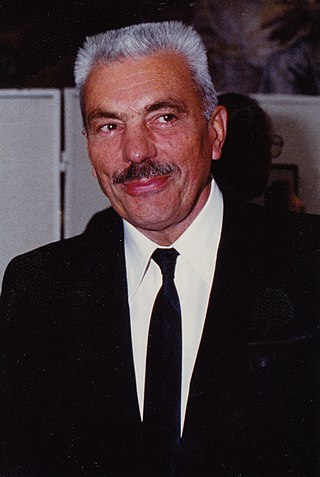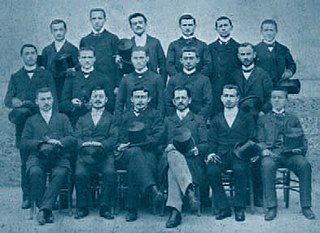
Amiens is a city and commune in northern France, located 120 km (75 mi) north of Paris and 100 km (62 mi) south-west of Lille. It is the capital of the Somme department in the region of Hauts-de-France and had a population of 135,429, as of 2021. A central landmark of the city is Amiens Cathedral, the largest Gothic cathedral in France. Amiens also has one of the largest university hospitals in France, with a capacity of 1,200 beds. The author Jules Verne lived in Amiens from 1871 until his death in 1905, and served on the city council for 15 years. Amiens is the birthplace of French president Emmanuel Macron.

Salomon Munk was a German-born Jewish-French Orientalist.

The Union Libérale Israélite de France, commonly referred to as the rue Copernic synagogue, is a Reform Jewish congregation and synagogue, located in the XVIe arrondissement of Paris, France. Inaugurated on 1 December 1907, it is the oldest Reform synagogue in France.

The beginnings of the history of the Jews in Besançon go back to the Middle Ages, a period during which the Jews settled in the city attracted by its activity as a commercial place. The community was founded at the end of the 14th century and, due to its status as a free imperial city, Besançon remained one of the only territories in present-day France to tolerate Jews after their expulsion from the kingdom of France in 1394. The community was nevertheless expelled in turn from Besançon in the middle of the 15th century. The Jews made a tentative return to the city in the 18th century, but it was only after the French Revolution, which emancipated them, that their situation in the Franche-Comté capital stabilized. Although the Jewish community never exceeded 2,000 people except on the eve of the Second World War, it experienced great economic success during the Industrial Revolution at the end of the 19th century, when the Lipmann family founded LIP, a brand of watchmaking which then became one of the economic engines of the region and remained associated with the name of the city.
Louis-Lazare Kahn, known as Admiral Louis Kahn, was the first French Jewish Admiral, and a leader of the French Jewish community.
Isaac Schneersohn was a French rabbi, industrialist, and the founder of the first Holocaust Archives and Memorial. He emigrated from Ukraine to France after the First World War.

René Debrie was a French linguist. He was born in Warloy-Baillon on 4 July 1920, and died in Amiens on 1 August 1989
Led by Philippe Pétain, the Vichy regime that replaced the French Third Republic in 1940 chose the path of collaboration with the Nazi occupiers. This policy included the Bousquet-Oberg accords of July 1942 that formalized the collaboration of the French police with the German police. This collaboration was manifested in particular by anti-Semitic measures taken by the Vichy government, and by its active participation in the genocide.
The following is a timeline of the history of the city of Amiens, France.
Louis Eugène Ferdinand Pouy was a 19th-century French writer and bibliographer
Alain Trogneux is a French teacher and local historian. He is a history professor in Amiens, and the author of several books about the local history of Picardy.

The Hotel de Berny Museum is a local history museum for the region of Picardy. It is located in Amiens. It is currently closed for building works. It is a Museum of France.
The École Yabné is a Jewish school located in Paris. Founded in 1948—by Chief Rabbi Jacob Kaplan, with the help of Rabbi Élie Munk and Chief Rabbi Henri Schilli—it continues to this day.

Alexandre ben Baruch Créhange, who wrote under the pen name Ben Baruch, was a French Jewish writer and communal leader.

The Synagogue of Lausanne is a Jewish congregation and synagogue, located at 1 Avenue de Florimont in Lausanne, Vaud, Switzerland. The building is a Cultural Property of National Significance.

The Saint-Avold Synagogue is a Jewish congregation and synagogue, located at the corner of Rue des Americains and Rue de la Mertzelle near Place Paul-Collin in Saint-Avold, in the Moselle department in Grand Est in north-eastern France. The current synagogue building, completed in 1956, replaces a nearby synagogue destroyed during the German occupation of France in World War II.

The Rashi Synagogue is an Orthodox Jewish congregation and synagogue, located on 5 rue Brunneval in Troyes, Grand Est, France. The synagogue is named after the medieval rabbi and biblical commentator Rashi, who was born and died in Troyes. A Sephardic synagogue, it is a member of the Consistoire central israélite de France. The site includes a museum, the Rashi House, a cultural center, and a library. The European University Rashi Institute,, located opposite the synagogue, is a research institute independent of the synagogue focused on Jewish studies, Semitic studies, and Monotheism.
This list of antisemitic publications in France chronologically gathers writings considered or claimed to be antisemitic, produced by French-speaking authors, whether writers or journalists, and published in French territory from the early 19th century to the present day.

Judaism in Motion is a Jewish denomination in France. Registered as a French religious association under the 1901 and 1905 French laws on religion, it was founded in 2019 from the merger of the Union libérale israélite de France (ULIF) and the Liberal Jewish Movement of France (MJLF).

Louis Germain Lévy was a French Rabbi and the founder of Union libérale israélite de France, the first Liberal synagogue in France.
















